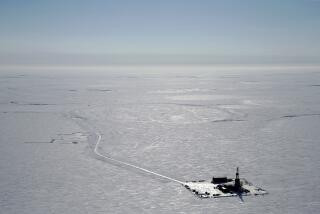Japan Now Backs Eskimo Whaling
- Share via
SEATTLE — Japan has reversed its opposition to bowhead whaling by Russian and Alaskan Eskimos, likely clearing the way for native communities all over America’s Arctic coast to continue subsistence hunting.
At a meeting of the International Whaling Commission last month, Japan had blocked the renewal of an aboriginal exemption to the 16-year-old worldwide hunting moratorium.
The move came after the United States refused to support Japan’s request that its coastal villages be allowed to hunt 50 minke whales each year--in addition to the hundreds that nation already takes for purported scientific purposes.
“We decided to rephrase our position,” Noboyuki Yagi, a spokesman for the Japanese Embassy in Washington, said Monday.
Japan will back an Alaska whaling quota if the U.S. can schedule an interim commission vote this year, Yagi said. But, he cautioned, “if the U.S. casts a no vote for Japan in April or May [2003], then we may have to talk about it again.”
Rolland Schmitten, head of the U.S. delegation, called Japan’s change of heart a “very encouraging sign.... Obviously, our goal will be to support the native hunters, both Russian and Alaskan, and to support keeping this quota under the IWC framework.”
U.S. officials were considering how best to conduct a new commission vote; the options include a vote by mail or a special inter-sessional gathering.
It may also be possible to bring the matter up during an October meeting of whaling commissioners already scheduled on another issue, Schmitten said.
Under the aboriginal whaling exemption, Alaskan natives have been allowed in recent years to hunt 67 bowhead whales annually.
While the species has been considered endangered around the world, scientific studies have shown that the bowhead population is healthy in the Alaskan Arctic--reproducing at a rate of 3.2% a year.
Alaskan whalers on Monday greeted Japan’s new expression of support with caution. “I’m somewhat relieved, but still skeptical,” said Edward Itta, vice chairman of the Alaska Eskimo Whaling Commission. “There are some caveats there.”
Dr. Michael Tillman, another member of the U.S. delegation to the IWC, was scheduled to meet with the whalers Monday night in Barrow, Alaska, to brief them on the issue.
The U.S. has opposed Japan’s request to hunt the minke whales because of the commercial nature of the hunts.
The Japanese villagers would be allowed to operate from commercial vessels using whale cannons; Alaskan natives use small sealskin boats and hand-held harpoons for their initial strikes, then follow up withtraditional guns and motorized skiffs.
In addition, some of the Japanese whale meat would be sold commercially, while the Alaskans use their take strictly for their own subsistence.
Yagi said Japan has filed its application as a limited resumption of commercial whaling but considers it a traditional hunt in villages with long, cultural histories of coastal minke whaling.
“No. 1, the coastal minke whaling has been conducted in a very limited number of places ... in many cases remote places from a city,” Yagi said.
“No. 2, the local economy has been heavily dependent on coastal whaling.
“Three, there is a certain, nonmonetary transaction of the whale meat in that particular coastal whaling, which is very different from huge-scale, industrial whaling.
“The first catch of the season is usually devoted to shrines, and [given] to local authorities to distribute to local people.”
More to Read
Sign up for Essential California
The most important California stories and recommendations in your inbox every morning.
You may occasionally receive promotional content from the Los Angeles Times.












